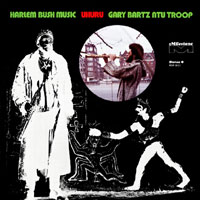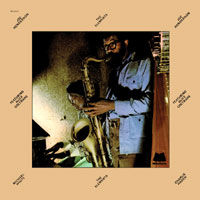Gary Bartz • Harlem Bush Music: Uhuru
Joe Henderson • The Elements
or the past couple of years, the release of new reissues by audiophile labels has slowed considerably, and the reason for this seems obvious. The big record labels that own all of the back catalogues have been eyeing the resurgence of vinyl sales -- and the success of reissue labels that have leased prime titles from those back catalogues. Rather than share the wealth with upstarts, the larger labels began churning out their own reissues. The most obvious example is Universal Music Group’s in-house reissue of its Blue Note catalogue, but Universal opted for quantity over quality. Sure, their LPs are cheaper than the exquisite reissues from Music Matters, but the resulting sound reflects this approach. The Concord Music Group, which owns not only Concord titles but also what we used to think of as the Fantasy catalogue (Prestige and its related labels), has embarked on a wide-ranging reissue program on a number of new sub-labels. Its Jazz Dispensary label has a new series titled Top Shelf that, at least so far, has focused on releasing fusion-jazz recordings from the early 1970s. I’m guessing that the folks at Concord are reading some of the same Internet bulletin boards as I am and have seen the demand for jazz of a more provocative nature mastered to a high standard but priced lower than current audiophile LPs. These two releases check all of those boxes. First of all, the pricing ($24.98) is very fair, especially considering the high production quality: 180-gram LPs from Quality Record Pressings and remastering by Kevin Gray are about as good as it gets. Throw in the first-class tip-on jackets and you might think you’ve been undercharged. In the old days, this material might have been released by Original Jazz Classics in flimsy jackets with remastering done in-house. If the only Joe Henderson you know is the fiery tenor-sax player from his Blue Note session or his late-career Verve releases, The Elements may come as a bit of a surprise. In 1967, Henderson signed with Orrin Keepnews’ new Milestone label and started experimenting with overdubbing and other studio effects. The Elements, more than his other mid-career work, took an especially experimental turn, and the appearance of Alice Coltrane on the session signals that it was in a spiritual direction. The four movements ("Fire," "Air," "Water" and "Earth") were recorded in October of 1973 at Village Recorders in Los Angeles, with Charlie Haden on bass; Coltrane on piano, harp, tamboura and harmonium; Kenneth Nash on a host of percussive instruments; and Michael White on violin. Think of this release as Henderson’s A Love Supreme and you get the idea. Alice Coltrane has a bit of a cult following these days, and her presence here no doubt accounts for this being the first release in the Top Shelf series. This LP sounds better than the original release, but the overdubbing robs it of any chance of sounding three-dimensional. Gary Bartz’s Harlem Bush Music: Uhuru was recorded in late 1970 and early 1971 at Decca Studios in New York, and it takes his music in a decidedly political direction. I spent that period in college in inner-city Detroit (where Joe Henderson had matriculated ten years earlier), and the sounds of this LP provide vivid recall of that time and place. Andy Bey provides vocals, more poetry than song, and if you know Abbey Lincoln’s vocals on Max Roach’s We Insist!, you know what to expect. With backing from Ron Carter, Nat Bettis and Harold White, the session is crisp in sound and delivery. Unlike the Henderson session, the recording engineer managed to create an excellent soundstage despite the overdubbing, and this recording is among the best-sounding from the Milestone catalogue (and there are many well-recorded Milestones titles). The foldout cover is exceptionally beautiful. For me, this is an essential title. The jazz market, except for a handful of
well-known titles, accounts for a very small percentage of record sales. These very
off-beat titles, both deserving of greater exposure, are not likely to sell enough to
please Concord’s accountants. If you are a fan who has bemoaned the lack of more
daring releases, this is the time to vote with your dollars. |


